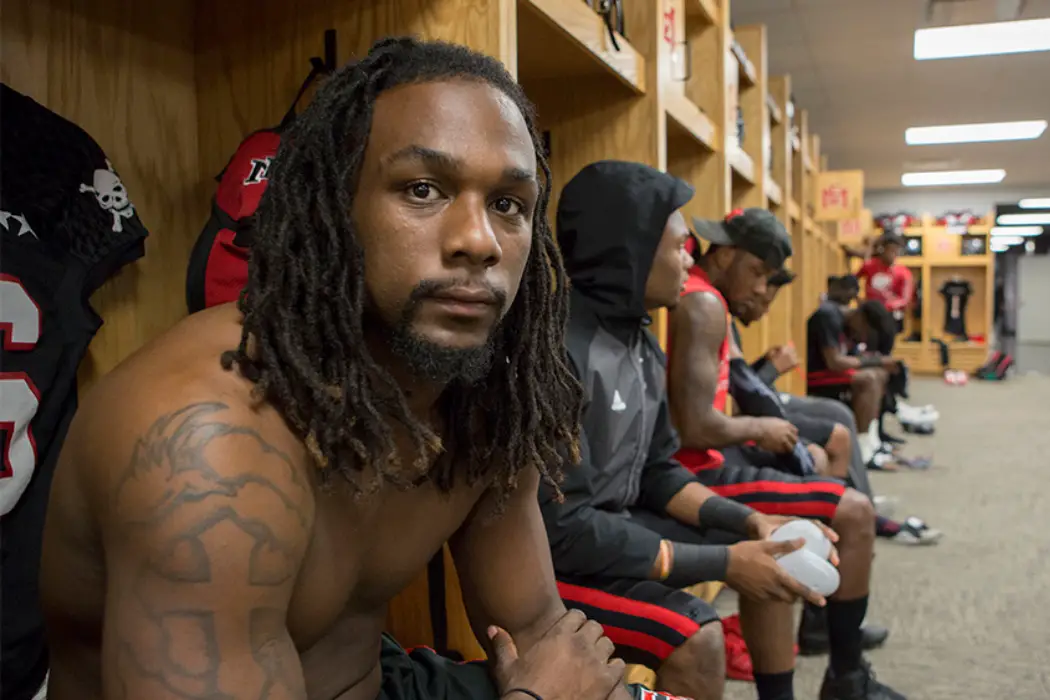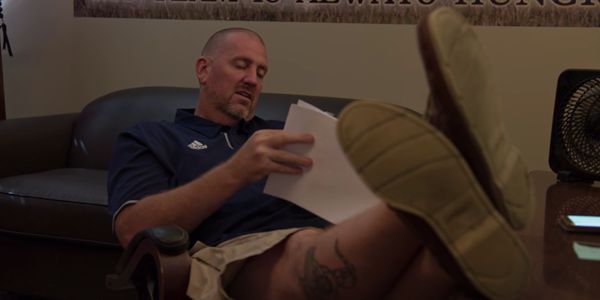LAST CHANCE U Season 4: Tug Of Wars

Soham Gadre is a writer/filmmaker in the Washington D.C. area.…
Independence Community College, which is the home of Season 4 of Netflix’s docudrama series Last Chance U, is a down and out 2-year school with a historically terrible football team. Since hiring Coach Josh Brown and bringing the lights and cameras from Netflix’s studio to their campus, the school managed to turn themselves around in what became Season 3 of the show. With expectations high, the school was now set, with egos larger and fiery as ever, to run the gamut on the Jayhawk Conference College Football scene.
They went 2-9. Dead last in the league.
Anyone who has attended a college or university with a vaunted sports program, namely football or basketball, knows that the cultural conversation of the school invariably must orbit it. The game is the single largest social gathering of students. Majors may be different, backgrounds may be different, friends and fraternities may be different, but the singular commonality of a student body at an American college is the sports program. For better and for worse.
Everyone’s Got A Goddamn Opinion
With the season basically in the dumps, the show seized the opportunity to divert its eyes from the field and focus its cameras instead on the peripheries of the football culture and its greater effect on everyone involved. The show has dappled in political topics in previous seasons, but this season warranted serious introspection. The show is now in a mature stage, with the fourth season that is coming under public scrutiny and a college football culture that is being re-examined socio-economically and with players welfare in highest priority.
The latest season of Last Chance U consciously understands that football is inherently political. Sports, in general, is political. Anything that includes money and takes advantage of its labor for the benefit of the top executive class is political, especially when the majority of that labor is black, and the majority of the ownership is white.

Last Chance U has also become more self-aware. The show understands that its cameras, its Netflix contract, and its ‘cast of characters’ all have an indivisible connection to the greater American society around them. Everything that happens on the show doesn’t stay there. As the conversation grows larger, everyone’s got an opinion, and everyone thinks they know what’s best for the school, for the team, and for the players.
The Community
Community Colleges exist to benefit their communities through educational and social outreach. They provide a more affordable and smoother transition from high-school to colleges for students who may not afford or be comfortable in a large university environment. But when the entire culture of a community college is overtaken by football and the football becomes corrosive, the community starts to feel the effects. Tax money going to out of state athletes, many of whom are simply passing through to bounce back to Division I program, feels like a loss to a community that is struggling to survive.
With billion-dollar conglomerate corporations swallowing small businesses whole and more and more locals leaving for big cities, Independence is struggling like many Midwestern small towns. This season of the show featured a large number of opinions and interviews with local residents who professed two general arguments, both of which were critical of the school’s large investment in the football program. While some members exhibited the same sort of xenophobia and closed-mindedness that has become sort of a cliché of Midwestern thinking in the current political climate, many others understood the importance of helping underprivileged kids achieve their dreams but felt the school was taking advantage of them to build its own reputation.
The Players
Interviews with players reveal that they are very aware of everything going on around them, systemically and socially. They know when they’re being given importance and when they’re being put on the back-burner. The problem inherent to the concept of Last Chance U is that everyone is fighting for their own last chance. They need the tapes, they need the reps, and they need the attention. But when you have so many mouths to feed, some of the players are going to be left behind. It also reveals how much the football team de-values everything about them beyond simply making a play on the field.

As the season wanes and the record gets worse, the interests of the team shift to the interests of the individual, and for good cause. What’s the point of sacrificing ones own health and sanity for a train that is going completely off the rails? Why put your future in detriment so that the coaches and administrators can maintain a reputation?
The Teachers
The teachers would agree. As many football players struggle in the classroom, the growing skeleton in the closet becomes the health and well-being of their physical and mental state. With concussions and injuries piling up, the question starts to arise of whether short-term success is worth the price of long-term suffering. The data is clear on football players, most of whom don’t ever make it to the NFL, and even of those that do, have careers that last only an average of 3.3 years with a median paycheck of $860,000 – most of which is non-guaranteed and can vanish with a single injury.
Teachers and guidance counselors often act as the voice of reason on the show because they’re the only ones who are both active in the school but outside of the gridiron. The teachers build a greater emotional connection with the players than anyone else. They know the players at their most vulnerable, in the places where they feel the most “inadequate”, i.e. in the classroom. This inadequacy is tackled in this season, however as a much larger cultural and social conversation, namely the idea that underprivileged black youth are drilled into the idea that sports are their only mode out of economic disparity. Education is not an option because they are not smart enough. This is a tale as old as time and was examined thoroughly in Steve James’s 1994 masterful documentary Hoop Dreams. Not much has changed in 25 years.
The Coach
Then there’s Coach Brown. Last Chance U would not exist were it not for the drama of a big personality coach. The popular refrain goes, “professional sports is a player’s league, but college sports is a coach’s league”. Unlike Eastern Mississippi Community College’s Coach Buddy Stephens, who’s rough deep-south personality and borderline racist outbursts made him infamous from the first two seasons of the show, Brown is a coastal guy (still white though). One who has, in a problematic way, positioned himself as relatable to black players because of his upbringing (he grew up in Compton, California).

While Brown certainly is able to relate more to players’ personalities and culture more than Stephens, he is still a white man in a power position over black players, and his egotism and self-importance, which he wears prominently tattooed to his sleeve, many times defeats the well-intentioned ideas he has of helping kids reach the next level of their football careers. Throughout the season we see Brown struggle to maintain control of his staff, and the season’s disappointing results are met with even more stubbornness on his part. For Brown, it’s always him against the world, it’s always him defending himself from haters who ‘don’t get it’, and anyone on his staff or team who tries to express dismay is on a short rope.
Eventually, the frustration boils over, the community begins to realize that Brown is too much of a liability for the school, and the students, while understanding their coach’s passion, start to tune out his monotonous bombast. With Brown’s eventual firing, Last Chance U is forced for the first time to confront its decision to center the coach as the premier personality of the show.
Last Chance U Season 4: In Conclusion
It’s going to be interesting now to see where the series goes. Will they change gears into being a player-centric, education-centric look at football players trying to reconcile with their undetermined futures in football, or will the show continue with its tried-and-true formula of finding yet another celebrity-personality coach, one who’s ego yet again becomes the main intrigue of viewers?
Have you seen Last Chance U? Where do you think the series will go next? Let us know in the comments below!
Watch Last Chance U
Does content like this matter to you?
Become a Member and support film journalism. Unlock access to all of Film Inquiry`s great articles. Join a community of like-minded readers who are passionate about cinema - get access to our private members Network, give back to independent filmmakers, and more.
Soham Gadre is a writer/filmmaker in the Washington D.C. area. He has written for Hyperallergic, MUBI Notebook, Popula, Vague Visages, and Bustle among others. He also works full-time for an environmental non-profit and is a screener for the Environmental Film Festival. Outside of film, he is a Chicago Bulls fan and frequenter of gastropubs.













